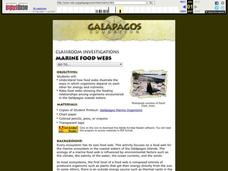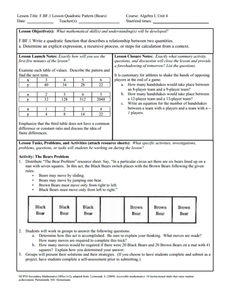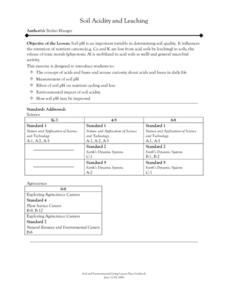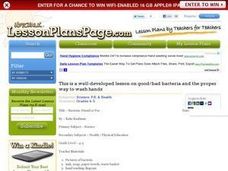Curated OER
Mobility: A Green City, Past, Present, and Future
Students explore transportation systems through history. In this transportation lesson, students determine how modes of transportation affect quality of life and design transportation plans for cities.
Curated OER
Build an Ice Cap
Students research Earth science by conducting an experiment in class. In this ice-cap lesson, students identify what an ice cap is and create a biome using a box which measures 1 ft. x 1 ft. Students participate in an animal role-playing...
Curated OER
Marine Food Webs
Learners examine how food webs illustrate the ways in which organisms depend on each other for energy and nutrients, and make food webs showing the feeding relationships among organisms encountered in the Gal??pagos coastal waters.
Curated OER
2105
Students read excerpts from Jon Scieszka's novel, 2095, prior to presenting their vision of the future in a creative project accompanied by written explanation. They design a museum exhibit which shows a scene from a science fiction book...
Curated OER
What Is a Pond?
Students identify animals and plants that live in a pond. In this marine biology lesson, students create a chart of animals and plants they think they would see at the pond. Students create a "pond symphony" by imitating the sounds they...
Curated OER
Indian Ocean Explored
Students examine the rich array of marine wildlife that lives in waters surrounding the Indian subcontinent. They explore the relationships among organisms in coral reefs. They explore environmental dangers to coral reefs and research...
Curated OER
Investigative Case: The Nancy Creek Challenge
Young scholars examine a case study of fish kill in Nancy Creek and identify the environmental conditions that favor life in a fresh water ecosystem. They work in small groups to assess the situation and gather resources from various...
Curated OER
100 Things You Can Do to Save the Planet
Young scholars examine the possible ways to recycle, reuse, and re-imagine products and objects in order to reduce pollution and waste on our planet. For this 100 things you can do to save the planet lesson, students take three actions...
Curated OER
Let the River Run
Pupils examine deposits found in a river in this science lesson. They collect data of sediment deposit found in the Mississippi river, then graph and analyze their data using the TI.
Curated OER
Bears
Students complete a variety of bear-related activities. They sort and graph teddy bears, distinguish between real and non-real bears and research bear life cycles and habitats.
Curated OER
Nanaotechnology: Small Science, BIG DEAL!
Students read an article that introduces them to the science and applications of nanotechnology. They discuss the the everyday examples of how nanotechnology is and can be used. In small groups, they observe and make inferences about...
Curated OER
Week 3: Pollution Source and Effects
Lab groups set up an experiment to observe what happens over time in collected pond water when fertilizer, representing pollution, is added. This website does not include student lab sheets, but background information, materials, and...
Clean Up Australia
Why are Batteries Harmful to the Environment?
Open this lesson by reading together about primary and secondary batteries (such as nickel-cadmium cells), problems they can cause in the environment, and how humans can minimize the damage. Afterward, little ones examine a collection of...
Curated OER
Red Wigglers
Students are introduced to the benefits of using Red Wiggler worms to produce compost. They identify the requirements for the worms and the methods to follow in order to produce compost. They draw a picture of a functioning worm bin.
Bridge
Mercury - Mercury is Rising
Hold a discussion in your class about the increase in mercury being found in fish that are caught commercially as food for humans. Given a worksheet, learners then calculate how much fish a person can safely eat each month to remain...
Curated OER
Composting
Using 2-liter bottles, junior ecologists create composting tubes in which they place nitrogen-rich and carbon-rich materials. They observe what changes occur over two weeks' time. Provide more specific direction to your class as to what...
Curated OER
Save the Bay!
Students explore environmental protection by creating a presentation in class. In this Chesapeake Bay lesson, students discuss the current threats from human beings towards the delicate balance of life near the bay. Students identify the...
Curated OER
Outcomes Science 4: Earth & Beyond
In this earth and beyond science worksheet, students read through 11 pages of information on weather, global warming, climate change and other related topics. There are many website links on the pages that provide additional information...
Curated OER
Environmental Education (Grade 4)
Fourth graders examine environmental concerns that affect their community. They work together to develop possible solutions and share them with the class. They ask questions to end the lesson.
Curated OER
Wetland Ecosystem Conservation
Learners read articles about wetland ecosystem conservation in Florida and other countries. They summarize information found in the articles. Students reflect on the information in the articles and write their feelings.
Curated OER
Marine & Aquatic Habitats Activities - Estuaries Are for the Birds!
Learners recognize that birds act as indicators of pollution because of their sensitivity to environmental change, and role play the manner in which marine debris can be hazardous to waterfowl.
Curated OER
Cavern Life
Students describe elements and conditions that effect cavern life. They explain the three cavern zones and the differences of each zone. They perform various activities based on grade level.
Curated OER
Soil Acidity and Leaching
Students are introduced to the concept of acids and bases and arouse curiosity about acids and bases in daily life. They are introduced to the measurement of soil pH. Pupils are introduced to the effect of soil pH on nutrient cycling...
Curated OER
Bacteria: Friend or Foe?
Young scholars examine a variety of environmental and industrial roles of bacteria. explore where bacteria can be found and distinguish bacteria from other organisms.























